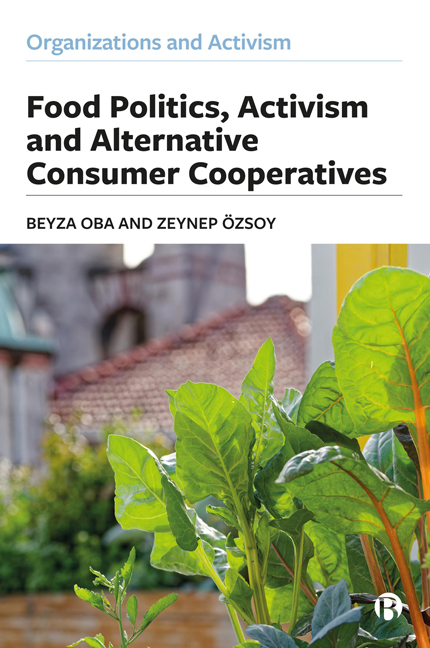Book contents
- Frontmatter
- Contents
- Series Editors’ Preface
- 1 Introduction: Experimenting with Direct Democracy
- 2 The Politics of Food: Alignment for Solidarity and Resistance
- 3 Against Neo-Liberalism and Authoritarianism: The Background to Food Politics in Turkey
- 4 The Political Economy of Consumer Cooperatives in Turkey
- 5 Alternative Consumer Cooperatives in the Making of a Public Sphere
- 6 Experimenting with an Alternative to the Capitalist Food Provisioning System
- 7 The Governance of Alternative Consumer Cooperatives
- 8 Instead of a Conclusion
- Notes
- References
- Index
8 - Instead of a Conclusion
Published online by Cambridge University Press: 27 March 2024
- Frontmatter
- Contents
- Series Editors’ Preface
- 1 Introduction: Experimenting with Direct Democracy
- 2 The Politics of Food: Alignment for Solidarity and Resistance
- 3 Against Neo-Liberalism and Authoritarianism: The Background to Food Politics in Turkey
- 4 The Political Economy of Consumer Cooperatives in Turkey
- 5 Alternative Consumer Cooperatives in the Making of a Public Sphere
- 6 Experimenting with an Alternative to the Capitalist Food Provisioning System
- 7 The Governance of Alternative Consumer Cooperatives
- 8 Instead of a Conclusion
- Notes
- References
- Index
Summary
The alternative consumer cooperatives (ACCs) studied in this book strive to transform the prevailing food production and consumption nexus by re-positioning the petty commodity producers and bridging the gap between the urban middle class and the rural areas. In so doing, the ACCs have introduced fundamental changes such as bypassing the middlemen, de-fetishising foodstuff and experimenting with zero-hierarchy and consensus-based decision-making that challenge the capitalist forms of organizing and doing business. They are not driven by the profit motive and growth-pursuing strategies but instead develop and promote solidarity, collective action and mutuality among and within the urban middle class and rural small producers that have been excluded from the economic realm by the authoritarian implementation of neo-liberal policies. The ACCs are transforming the long-established socio-economic rural– urban relations in agriculture and invite other constituencies (municipalities and professional groups like architects, designers, software engineers and actors) to participate in the diffusion of alternative ways of organizing. The actions taken, tools developed and positions taken are important in understanding this transformation process and assessing its future trajectories. Thus, in this study we have tried to understand and describe how and why the ACCs evolved and how they challenge capitalist logic in food provisioning by experimenting and re-organizing their practices as problems are encountered.
The ACCs are grassroot organizations initiated by petty commodity producers, their representative organizations and the urban middle class who are excluded from the economic and social realm by the implementation of neo-liberal policies. As discussed in Chapter 4, the initiation of the ACCs is marked by the collaboration of petty commodity producers and urban middle-class citizens. As small producers, individual producers (for example, İlhan Koçulu and Ali Ünüvar) that had prior experience with producer cooperatives, Kibele (a producer cooperative) and Çiftçi-Sen (Farmers’ Union) were actively involved in the founding of the ACCs. The association Tohum-İzi Derneği (formerly KEÇI– Solidarity Initiative between Urbanites and Farmers) and the academic and administrative staff of Boğaziçi University were the initial representatives of the consumers. The dominant values that inspired and guided these groups were rooted in the premises of La Via Campesina.
- Type
- Chapter
- Information
- Food Politics, Activism and Alternative Consumer Cooperatives , pp. 141 - 149Publisher: Bristol University PressPrint publication year: 2023

